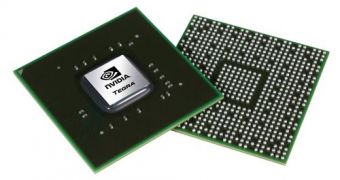Many rumors have been circulating the web concerning NVIDIA and its supposed strategy regarding x86 technology, but a more recent interview between the company's CEO and CNET reveals that the Santa Clara, California-based GPU maker will focus on ARM instead of trying to recover from having been out of the x86 business for over a year.
The essence of that interview between Nvidia CEO Jen-Hsun Huang and CNET's Brooke Chrothers is that the company will focus on ARM-based products, such as the Tegra 2 chips that are already selling.
Huang made a point of stating that Tegra 2 is available in two iterations, intended for mobile phones and tablets, and that they are both being made part of products.
Until some time ago, NVIDIA used to make chipsets for x86 CPUs, but Intel filed a lawsuit that put a halt to this practice and, while still ongoing, already made its impact felt.
Basically, because it couldn't make x86 technologies for over a year, the company has fallen behind in this area.
As such, Huang states that efforts will be directed towards further improvement of its ARM SoCs and other projects that will come into being as time goes on.
"Our CPU strategy is ARM," Huang said. "ARM is the fastest growing processor architecture in the world today. ARM supports (Google's) Android best. And Android is the fastest growing OS in the world today.”
"The FTC case is about Intel's monopoly behavior and conduct. Our (court) dispute with Intel is related to a pair of contracts--a license of (data) bus rights to us and the cross license to them," he went on to saying.
“Intel's conduct as a company informs some of their behavior in our case. However, our case is not related to the FTC. Our case is specifically related to a contract dispute," he clarified.
"They (Intel) have disrupted our chipset business. The damage has been done. We've been out of the chipset business for well over a year, so if this got resolved we're not expecting to ramp back up the thousand engineers that we had working on chipsets."
Unsurprisingly, Intel did not comment on the interview.

 14 DAY TRIAL //
14 DAY TRIAL //